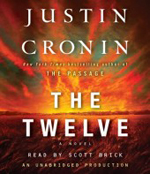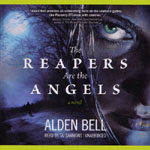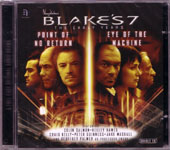
 The Twelve
The Twelve
By Justin Cronin; Read by Scott Brick
CD or MP3 -[UNABRIDGED]
Publisher: Random House Audio
Published: October 16, 2012
ISBN: 9780307702043/9780739366523
Themes: / Vampires / Post-apocalypse / Virus /
Publisher summary:
The end of the world was only the beginning.
In his internationally bestselling and critically acclaimed novel The Passage, Justin Cronin constructed an unforgettable world transformed by a government experiment gone horribly wrong. Now the scope widens and the intensity deepens as the epic story surges forward with . . .
THE TWELVE
In the present day, as the man-made apocalypse unfolds, three strangers navigate the chaos. Lila, a doctor and an expectant mother, is so shattered by the spread of violence and infection that she continues to plan for her child’s arrival even as society dissolves around her. Kittridge, known to the world as “Last Stand in Denver,” has been forced to flee his stronghold and is now on the road, dodging the infected, armed but alone and well aware that a tank of gas will get him only so far. April is a teenager fighting to guide her little brother safely through a landscape of death and ruin. These three will learn that they have not been fully abandoned—and that in connection lies hope, even on the darkest of nights.
One hundred years in the future, Amy and the others fight on for humankind’s salvation . . . unaware that the rules have changed. The enemy has evolved, and a dark new order has arisen with a vision of the future infinitely more horrifying than man’s extinction. If the Twelve are to fall, one of those united to vanquish them will have to pay the ultimate price.
I wasn’t going to read this book. I wasn’t! I felt like The Passage was a well-contained story and I didn’t understand where else it could go. I will let the author explain what he focuses on in The Twelve, because I find it too difficult to summarize. (This is from an older post from 2010 on io9.com.)
The next two books each go back to Year Zero at the outset, to reset the story, and to deal with something you didn’t see and didn’t know was as important as it was. It’s not a linear quest story, which I would find dull and plodding. With each book, you need to have the narrative terms reestablished with fresh elements. Also, if you didn’t see [a character] die, they’re not necessarily dead. There’s a big cast in the first book, and plenty of unresolved stuff. I will resolve it by the end. [Early vampire character] Anthony Carter? No, not abandoning him.
In [The Twelve], you go back to what happened in Denver after the outbreak took place. The story will resume in that location a few days after breakout. So you can see another angle on what occurred and certain elements will affect our band of heroes 100 years in the future. It will be called The Twelve – and it’s not who you think.
This means that the story starts with where Amy is, and follows up with an assortment of other characters. Just like in The Passage, storylines are dropped completely as others are followed. Since I was listening to the audio, it was a bit more difficult to keep track of, just because it was harder to flip back and get a refresher on names, etc.
The author provides a lot more information about what happened to various people at the very beginning, explaining how some of the communities were formed, the horrific actions of the USA government (including events like “The Field”), and other parts of the novel jump around up to 97 years from when the virus originally took hold. This kind of information is usually my favorite part of post-apocalyptic stories – the rebuilding. What kind of societies form? How do they work? Who has control? I think Justin Cronin shows a lot of creativity and variety in these situations, since it isn’t just one story, but multiple. Many of the characters, locations, and situations overlap throughout the story, and I had this sense of the author as a puppeteer, drawing strings of stories around each other. Kudos to him that they never seem to tangle in disaster.
Scott Brick is the narrator for the audiobook of The Twelve, and does a fantastic job. He doesn’t bother doing a lot of voices, but his inflection is perfect. He has this ability to get out of the way of the story that I really appreciate when I’m listening. It just comes to life and I’m not constantly thinking of HIM, but of the story.
And The Twelve requires a lot of thinking and paying attention. The multiple story lines, the jumping around in time and history, and the sprinkling of quotations that Cronin throws in kept my attention. He started with a Mark Strand poem, almost as if I needed something to clinch whether or not I’d read this book.
I won’t have that dilemma for the final book. While this story has a satisfying climax, I was left with far more questions this time around. I’m not sure I know which side everyone is on. I’m not sure I even know what sides there are, anymore. What I am sure about is that this book is hard to put down.
Posted by Jenny Colvin

 Mrs. Shelley
Mrs. Shelley

 The Reapers Are The Angels
The Reapers Are The Angels


